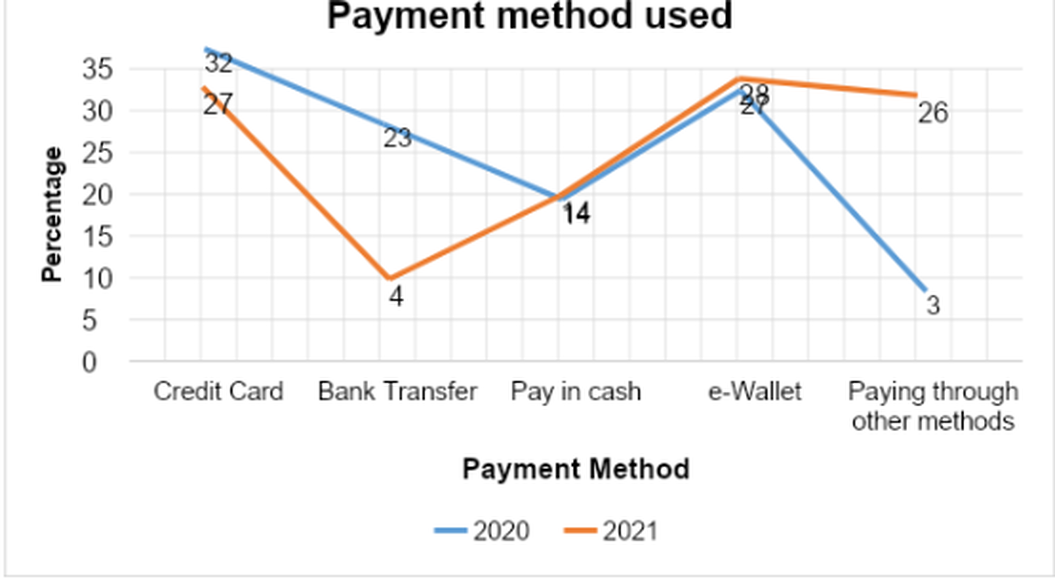COVID-19 is arguably the virus no one on this planet could ever forget. Many lives have been affected in countless ways. The effect it had on attitudes and lifestyles tells us the whole impact. This impact has been felt by Muslims through the Global Muslim Travel Index (GMTI) report, GMTI 2021, which the author is trying to analyse in this article.
The figure above shows that it was reported that over half of the participants strongly agreed to having limited time for dining outdoors during COVID-19. Only 16% agree that they have limited time to eat outside, and 16.9% are unsure.
As shown in the graph above, more than half of the participants agreed to have their meals delivered during the pandemic, while the remaining 24 percent did not. This could be because there were curfews in place that prevented people from going out. However, 23 percent stated that they were unsure of what they desired.
According to the graph above, more than 40 percent of those polled preferred to stay at home rather than travel during the pandemic. This is largely due to the holiness of the season, and they would prefer to spend it with their family members. However, 19.1 percent of them disagree that they should not travel. A good reason for the disagreement could be related to the fact that vaccine boosters and travel restrictions were lifted.
As shown in the figure above, over 40 percent of the participants agreed to be curious about other cultures, which might be one reason they would want to travel during COVID-19.
The figure above reveals that the report found that over two-quarters of the participants agreed to stream videos on the internet during COVID-19. However, almost a quarter of them were not sure if they would be streaming videos on the internet during COVID-19.
It was found that over 47 percent of the participants agreed to stay highly entertained during COVID-19, while over one-third of them disagreed. But almost a third of them were not sure of what they wanted in terms of entertainment. Staying entertained allowed them to be sane during the pandemic.
The figure above reveals that over 20 percent of participants agreed to talk to family and friends during COVID-19, while almost two-thirds of them disagreed. Only 29.2 percent of them weren't sure about it. Talking to friends was necessary to ensure they were in good health, as one was not sure of when they could die from COVID-19.
The above figure shows that it was found that over two-thirds of the participants agreed to use technology during the health pandemic. However, 22.5 percent of them said they were not sure about technology usage. This could be that participants have a perception that using technology-related things will mean finding conspiracy theories about how COVID-19 spread.
The figure above shows that over two-quarters of participants agreed to have a preference for buying their things online during the health pandemic, while 20 percent disagreed. The latter could be that the participants still hoped the restriction would be lifted and they would get a chance to visit malls to buy their things. Meanwhile, almost a third of the participants were not sure about buying online.
Participants were also asked if they avoided spending unnecessarily during COVID-19. This is shown in the figure above. It is seen that over half of them agreed to avoid frugal spending, while over a third were not sure of what to say. However, almost 9 percent revealed that they disagreed with avoiding frugal spending. The truth is that avoiding spending frugally could mean saving themselves from prolonged periods of no earnings and still being able to spend, as nobody knew if COVID-19 could end with so many waves.
The figure above shows that over two-quarters of the participants agreed to buy without paying cash. However, more than 15 percent of them disagreed. This could be that they got accustomed to paying using other methods largely as a result of the health pandemic, and they were cautious of getting reinfected.
It was found that over two-thirds of the participants agreed to go for Haj during the health pandemic. Only 26 percent were unsure, but 11 percent were opposed to performing Haj during this time period. The latter could be because there were limits on how many people should be at an event to avoid the rapid spread of the virus.
The figure below reveals the trends of payment methods used during the Ramadan seasons of 2020 and 2021. It is shown that only 27 percent of participants used credit cards in 2021, as compared to the 32 percent that used the same method in the year prior. This decline can be related to the high prevalence of COVID-19 in 2020 as compared to 2021. Only 4 percent of the participants used bank transfers when buying during the health pandemic in 2021, as compared to 23 percent in 2020.
An equal number of participants responded that they had paid in cash in both the 2020 and 2021 years. Paying with an e-Wallet has increased by only one percentage point in 2021. It is also interesting to see that 26 percent of the participants used other payment methods to buy their things in 2021, as compared to 3 percent in 2020. There is one thing to explain the rapid increase in other methods of payment in 2021, and that is digital currency, which gained momentum during the health pandemic.

Conclusion
COVID-19 has had a horrendous impact on many lives around the world, and Muslims are no exception. It has impacted their eating habits, travelling habits, entertainment habits, consumption habits, their religious practices, and the ways they pay for their goods. Some for the better and some for the worst, as traditions can never be neglected. This article has attempted to highlight all of that for you.
Download the full report here.